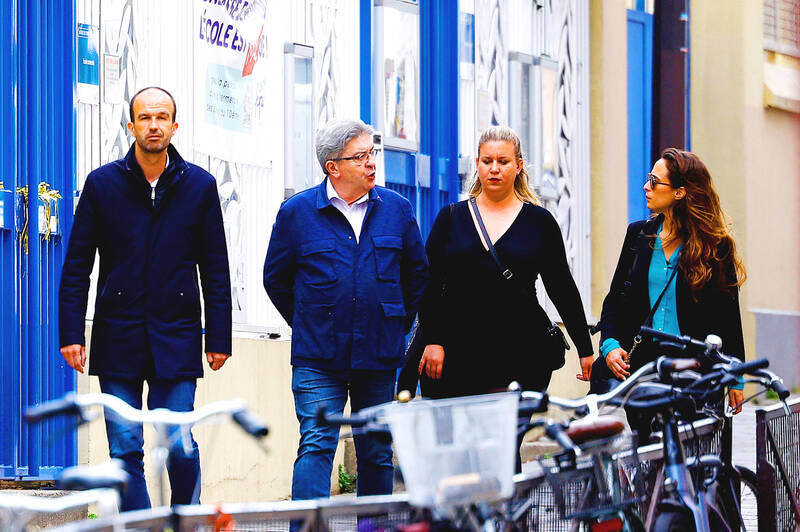France’s left has a Jean-Luc Melenchon problem.
The towering firebrand of France’s hard-left, Melenchon’s France Unbowed (LFI) party won the most seats of the leftist alliance that scored a shock victory over the far right in Sunday’s snap legislative election.
His party’s top position gives him a credible claim to be France’s next prime minister, but his hopes of dragging France sharply leftward appear dead after mainstream party chiefs quickly ruled out forming a coalition with a tax-and-spend, pro-Gaza figure who many in France view as an anti-Semitic radical.

Photo: EPA-EFE
The New Popular Front (NFP) leftist alliance could seek to cobble together an unwieldy coalition without him, or try to form a minority government by reaching individual deals on legislation with rivals, but neither would be easy.
Melenchon, who denies accusations of anti-Semitism, “is the most divisive figure within the NFP,” said Socialist leader Olivier Faure, referring to the New Popular Front (NFP) leftist alliance.
Other members of the NFP, speaking on condition of anonymity, were even more frank.
“Melenchon is a problem,” a Green Party lawmaker said.
Melenchon, 72, has been a fixture of the French left for decades, holding ministerial posts in past governments when he was a Socialist party member. He ran for president in 2012, 2017 and 2022, coming third that year behind far-right leader Marine Le Pen and French President Emmanuel Macron.
Although not a lawmaker himself, he holds a tight grip on the LFI. An admirer of Latin American revolutionary leaders, he advocates price controls, a huge increase in the minimum wage and a reinstatement of the wealth tax.
His reputation took a beating in 2018 when he was caught on camera shouting “I am the Republic!” to anti-graft investigators searching his party headquarters
The question of how to deal with Melenchon is just one of the headaches facing France’s new lawmakers as they seek to chart a path forward for a country unaccustomed to the chaotic coalition governments often seen in Germany and the Netherlands.
Leaders of the component parties of the NFP have been meeting to discuss who should replace French Prime Minister Gabriel Attal, who tendered his resignation to Macron on Monday, but is expected to stay on in a caretaker capacity.
A source at the Communist Party, one of the NFP’s smaller members, said discussions were also centered on what strategy the alliance should adopt. The strong showing of the Socialists within the NFP alliance has given them more leverage than before.
Melenchon was the first political leader to react to Sunday’s legislative results, in what appeared an early pitch for the prime ministership. He said the result was a damning indictment of Macron and the far right.
“The president must invite the New Popular Front to govern,” he said.
Melenchon’s mainstream opponents were quick to say they would not do business with him.
Former French prime minister Edouard Philippe, seen as a possible Macron successor in 2027, said any potential coalition government “cannot be the work of a single man.”
“The credibility of our country could be damaged by this and the centrist political forces must without compromise make an agreement to stabilize politics, but without France Unbowed and the RN,” he said.
Macron’s second-placed bloc, as well as representatives of the center-right Republicans, have also appeared to rule out a coalition with Melenchon.
Green party leader Marine Tondelier, a breakout star of the campaign who is also a potential prime ministerial contender, was more circumspect. She told France Inter radio the post could be filled by someone from LFI, the Greens or the Socialists.

Australia has announced an agreement with the tiny Pacific nation Nauru enabling it to send hundreds of immigrants to the barren island. The deal affects more than 220 immigrants in Australia, including some convicted of serious crimes. Australian Minister of Home Affairs Tony Burke signed the memorandum of understanding on a visit to Nauru, the government said in a statement on Friday. “It contains undertakings for the proper treatment and long-term residence of people who have no legal right to stay in Australia, to be received in Nauru,” it said. “Australia will provide funding to underpin this arrangement and support Nauru’s long-term economic

‘NEO-NAZIS’: A minister described the rally as ‘spreading hate’ and ‘dividing our communities,’ adding that it had been organized and promoted by far-right groups Thousands of Australians joined anti-immigration rallies across the country yesterday that the center-left government condemned, saying they sought to spread hate and were linked to neo-Nazis. “March for Australia” rallies against immigration were held in Sydney, and other state capitals and regional centers, according to the group’s Web site. “Mass migration has torn at the bonds that held our communities together,” the Web site said. The group posted on X on Saturday that the rallies aimed to do “what the mainstream politicians never have the courage to do: demand an end to mass immigration.” The group also said it was concerned about culture,

ANGER: Unrest worsened after a taxi driver was killed by a police vehicle on Thursday, as protesters set alight government buildings across the nation Protests worsened overnight across major cities of Indonesia, far beyond the capital, Jakarta, as demonstrators defied Indonesian President Prabowo Subianto’s call for calm. The most serious unrest was seen in the eastern city of Makassar, while protests also unfolded in Bandung, Surabaya, Solo and Yogyakarta. By yesterday morning, crowds had dispersed in Jakarta. Troops patrolled the streets with tactical vehicles and helped civilians clear trash, although smoke was still rising in various protest sites. Three people died and five were injured in Makassar when protesters set fire to the regional parliament building during a plenary session on Friday evening, according to

CRACKDOWN: The Indonesian president vowed to clamp down on ‘treason and terrorism,’ while acceding to some protest demands to revoke lawmaker benefits Protests in Indonesia over rising living costs and inequality intensified overnight, prompting Indonesian President Prabowo Subianto to cancel a planned trip to China, while demonstrators reportedly targeted the homes of the finance minister and several lawmakers. Rioters entered Indonesian Minister of Finance Sri Mulyani Indrawati’s residence near Jakarta early yesterday, but were repelled by armed forces personnel, Kompas reported. Items were taken from the homes of lawmaker Ahmad Sahroni and two others, according to Detik.com. The reports of looting could not be independently verified, and the finance ministry has not responded to requests for comment. The protests were sparked by outrage over